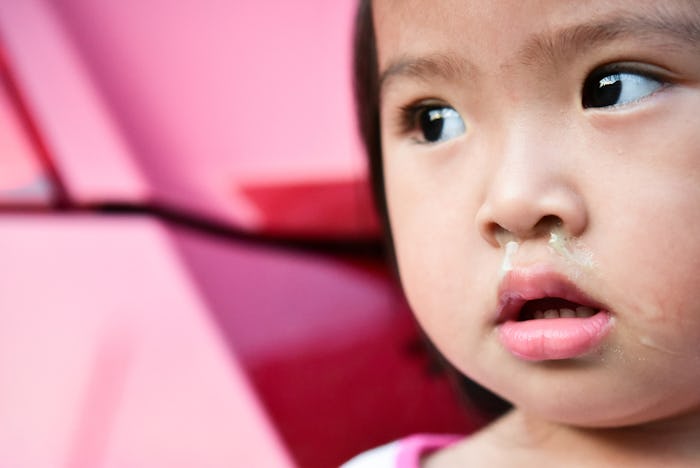When a toddler is sick, even a very verbal one may not have the language to tell you exactly what's wrong. What looks like a common cold could really be something more serious and possibly something that warrants a doctor's visit and antibiotics. The hard part is knowing when you've hit that point, so it's helpful to know the signs your toddler has a sinus infection and not just a common cold.
A sinus infection, or sinusitis ("itis" is an inflammation), "occurs when the fluid that accumulates in the sinuses during a cold or allergy doesn't drain sufficiently through the nose and the back of the throat and eventually becomes infected," according to Dr. William Sears, a pediatrician who has written 22 books on childcare. He cautioned that if your child's cold has lasted for 10 days, if they seem sicker than usual and have lost their energy, it could be a good idea to see a doctor.
What can you do to treat a sinus infection? The reason Dr. Sears recommends you see a doctor is that sinus infections that are bacterial (as opposed to viral, which is a really bad cold), can be treated with antibiotics. Dr. Raj Sindwani, an ear, nose and throat specialist at the Cleveland Clinic, said that viral sinus infections typically resolve on their own, much as a cold does. He echoed Dr. Sears in suggesting you seek care if it doesn't resolve in seven to 10 days. The only way to really know for sure if it's bacterial is to take a swab inside your child's nose and culture it to see if it grows bacteria, like they do for strep tests. The antibiotics should resolve the symptoms within the first few days, but remember to give the whole course that has been prescribed, even if by the end your child appears perfectly fine.
1Chronic Runny Nose
If your toddler blows through an entire box of tissues in a day, it might be that they have sinusitis. You can treat the runny nose with antihistamines, available in liquid, chewable and melt-away forms, but be warned they may make your little one drowsy. Because of that, the American Academy of Pediatrics (AAP) recommended giving antihistamines in the evening.
If their nose gets really crusty, you could try using a rubber bulb aspirator or a Nosefrida, a contraption that is a long hose that you use to suck out the snot with your mouth (don't panic, there's a filter between you and the mucous).
2Nasal Congestion
Nasal congestion, aka a stuffy nose, can be very frustrating. No amount of nose blowing (and it's not that easy to get a toddler to blow their nose) will relieve it. The American Academy of Otolaryngology-Head and Neck Surgery suggested using a nasal decongestant spray or saline nose drops to try to relieve the congestion. Some time in a steamy shower might give some relief, too.
3Swollen Eyes & Puffy Face
Dr. Sears said swollen eyes, especially when your toddler wakes up, could indicate it's a sinus infection. The American Academy of Otolaryngology-Head and Neck Surgery also confirmed there could be swelling around your toddler's eyes. In fact, in general, inflammation in the sinuses could cause your child's face to get a little puffy, Dr. Ken Feuerstein, a pediatrician in New York tells Romper.
4Face Pain
Sinusitis is sometimes accompanied by tenderness on either side of their nose. Dr. Feuerstein says your toddler may complain of face pain, and this could be due to the congestion that is in the sinuses causing discomfort and pain in the face in general.
5Ear Popping or Pain
The congestion described above can also give them the same kind of ear pain you get on an airplane. Dr. Feuerstein warns that the constant desire to pop their ears could be a sign that your toddler has a sinus infection.
6Yellow or Green Mucous That Smells
Not only is the color of your toddler's mucous a possible indication of infection (clear or yellow is normal, when the yellow starts heading toward green, it could be an infection), but the smell can be as well. If your child's mucous has a foul smell, it could indicate a virus or bacterial infection, explained Web MD.
7Bad Breath
The same thing that causes the mucous to have a foul odor could also affect something that seems totally unrelated, but isn't: their breath. "One of the first symptoms (besides a clogged nose and pain) is usually bad breath," said Thomas P. Connelly D.D.S to The Huffington Post.
Check out Romper's new video series, Bearing The Motherload, where disagreeing parents from different sides of an issue sit down with a mediator and talk about how to support (and not judge) each other’s parenting perspectives. New episodes air Mondays on Facebook.
